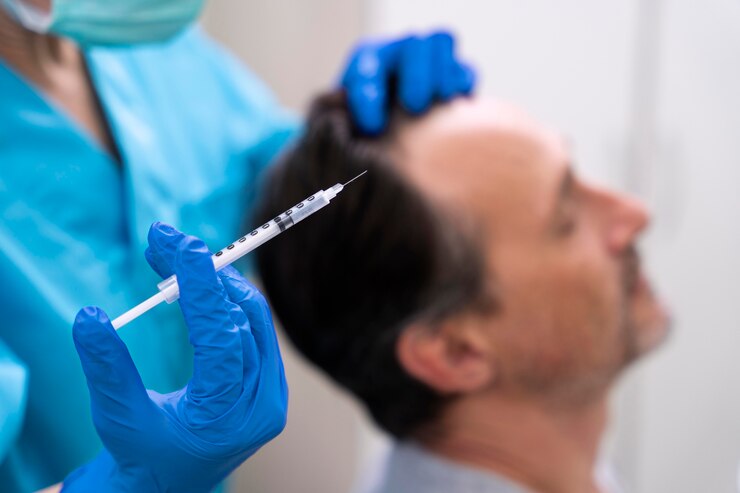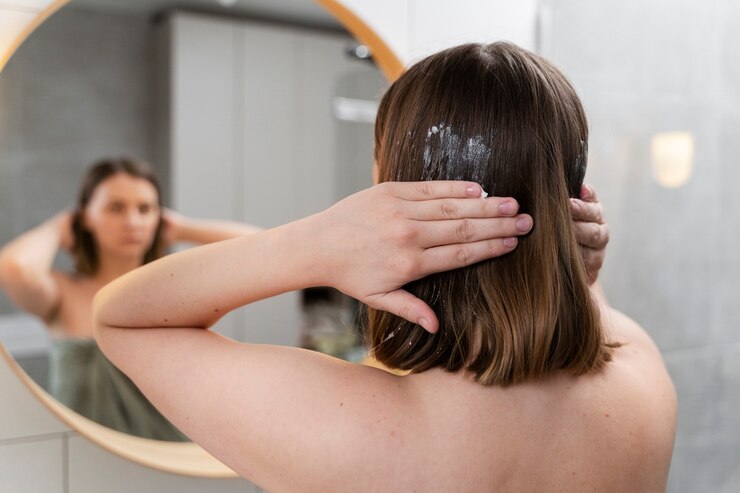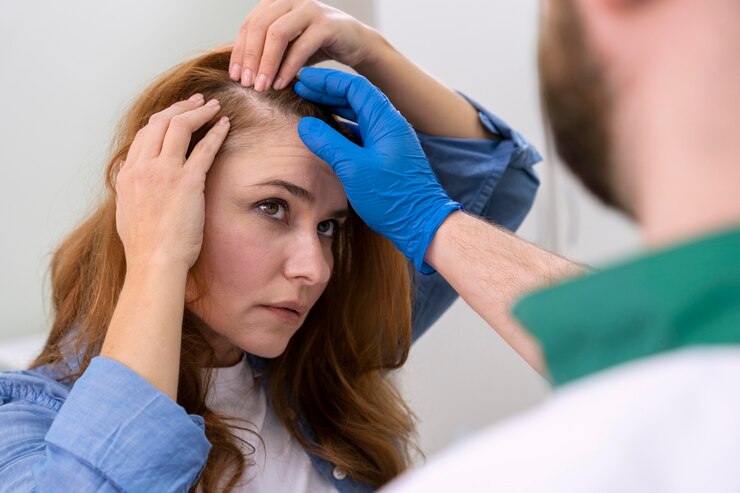Hair Loss Cure Currently, there is no universal cure for hair loss, as treatments vary based on the underlying cause. FDA-approved medications like minoxidil and finasteride are effective for certain types of hair loss.
Hair loss affects millions of people worldwide, and its impact on self-esteem can be significant. Understanding the root of hair thinning or balding is crucial in determining the appropriate course of action. Male and female pattern baldness, the most common forms of hair loss, are often addressed with over-the-counter remedies, prescription drugs, and even surgical procedures like hair transplants.
Natural remedies and lifestyle changes also play a supportive role in managing hair health. Advances in medical research continue to explore new treatments, and consulting a healthcare professional is the best start to finding a tailored approach to hair loss management. Individuals should always seek professional advice to match treatments to their specific condition.

Photo Credit: https://www.freepik.com
What Causes Hair Loss?
Hair loss, a condition that affects many people across different age groups and genders, is often a source of distress and anxiety. Understanding the underlying causes of hair loss is crucial to finding the appropriate cure. While hair loss may seem like a straightforward issue, it actually has a complex range of causes, including genetics, hormonal changes, and various medical conditions. This section delves into the most common factors contributing to hair loss.
Genetics
Genetics play a pivotal role in hair loss, particularly in a condition known as androgenetic alopecia, also referred to as male or female pattern baldness. This hereditary condition usually follows a predictable pattern, where men experience a receding hairline and bald spots, while women may notice thinning hair along the crown of their heads.
Hormonal Changes
Another significant contributor to hair loss is hormonal changes. These can occur during various life stages such as pregnancy, childbirth, menopause, or as a result of thyroid problems. Hormones play a critical role in regulating the hair growth cycle, and imbalances can lead to both temporary and permanent hair loss.
- Pregnancy-related hair loss
- Postpartum hair shedding
- Menopause-related changes in hair texture and volume
- Thyroid-induced alopecia
Medical Conditions
Medical conditions are also key culprits in hair loss scenarios. Conditions such as alopecia areata cause the body’s immune system to attack hair follicles, leading to sudden hair loss. Scalp infections like ringworm can lead to scaly patches and hair loss. Other chronic illnesses, such as lupus and diabetes, may also have hair loss as a symptom.
Hair loss can also stem from certain medications used to treat cancer, arthritis, depression, heart problems, and high blood pressure. It’s essential to review medication side effects and discuss alternatives with a healthcare provider if hair loss becomes a concern.
| Condition | Description | Associated Hair Loss Type |
|---|---|---|
| Alopecia Areata | Autoimmune disorder | Sudden hair loss in patches |
| Scalp Infections | Fungal infections like ringworm | Hair loss with scaly patches |
| Lupus | Chronic autoimmune disease | Diffuse hair thinning |
| Diabetes | Chronic metabolic disorder | Hair loss due to hormonal imbalance |
The above HTML content provides a structured and informative section for a blog post discussing the causes of hair loss. It contains clear subheadings and offers various HTML elements to present data effectively. The content is optimized for SEO with targeted keywords and is written in an engaging, concise, and informative style.
Current Treatments For Hair Loss
Finding an effective cure for hair loss can be a daunting journey. With advancements in science and medicine, a variety of treatments have emerged, offering hope to those struggling with this condition. Whether it’s a temporary solution or a more permanent fix, understanding the available treatments is the first step towards regaining your confidence and your hair. Below, we explore the most recognized and widely utilized methods for treating hair loss in today’s world.
Medications
A common first line of defense against hair loss includes FDA-approved medications. These are primarily aimed at slowing down hair loss or stimulating hair growth. The two most prominent medications are:
- Minoxidil – Available over the counter, it’s applied directly to the scalp and can stimulate hair growth and prolong the growth phase of hair follicles.
- Finasteride – A prescription pill that can slow hair loss by inhibiting the hormone responsible for genetic hair loss, DHT.
These medications can yield results but often require ongoing use and can come with side effects, making it important to consult with a healthcare professional.
Hair Transplant
For those seeking a more permanent solution, hair transplant surgery may be the answer. This procedure involves transplanting hair follicles from denser areas of the scalp or other body parts to the thinning or balding regions.
- Follicular Unit Transplantation (FUT) – A strip of scalp is removed from the back of the head and individual hair follicles are transplanted.
- Follicular Unit Extraction (FUE) – Hair follicles are individually taken from the scalp and transplanted to needed areas.
Both techniques require a skilled surgeon and come with a period of recovery, though FUE tends to be less invasive.
Laser Therapy
The use of low-level laser therapy (LLLT) has gained traction as a non-invasive treatment option. LLLT uses laser light to stimulate cell growth and revitalize hair follicles. Devices for this treatment come in various forms, such as:
| Laser Device Type | Usage Method |
|---|---|
| Laser Combs | Manually operated over the scalp |
| Laser Helmets | Worn on the head for hands-free treatment |
| Laser Caps | Portable and discreet under regular hats |
Treatments typically require consistent use over a period of months to see results and are best suited for mild to moderate hair loss.
Emerging Hair Loss Cure Research
Thinning tresses and bald patches can be an unwelcome reality for many. The quest for a hair loss cure has led to significant advancements in research, particularly with a focus on regenerative medicine and genetic engineering. The realm of Emerging Hair Loss Cure Research unveils promising treatments that could revolutionize how we think about and address hair loss. By probing into the fabric of our biological makeup, scientists are paving the way towards groundbreaking solutions.
Stem Cell Therapy
Stem cell therapy represents a cutting-edge frontier in hair regeneration. This innovative approach leverages the body’s own repair mechanisms by utilizing pluripotent stem cells. These cells are unique in that they have the potential to transform into any cell type, including those that encourage hair growth. Research suggests that introducing these cells to damaged hair follicles could spark a regeneration process, potentially leading to new hair growth.
Platelet-rich Plasma (prp) Treatment
Another avenue of hair restoration research is Platelet-Rich Plasma (PRP) Treatment. PRP therapy starts with drawing a small amount of the patient’s blood, which is then processed to concentrate the platelets. These enriched platelets are re-injected into the scalp, with the aim to stimulate hair follicles and encourage new growth. The growth factors in PRP are believed to accelerate healing and regenerate tissue, making it a promising non-surgical option. Research continues to refine this procedure, optimizing its efficacy and longevity of results.
Gene Therapy
At the molecular level, Gene Therapy holds the potential to offer a permanent solution to hair loss. By pinpointing specific genetic markers associated with alopecia, scientists aim to alter these genes to either suppress hair loss or promote growth. While still in the developmental stages, gene editing techniques such as CRISPR/Cas9 give a glimpse into a future where hair loss could be a thing of the past. The intricacies of safely implementing gene therapy still present hurdles, but progress in this domain could spell a landmark shift in hair loss treatments.
Lifestyle Factors Impacting Hair Loss
Unraveling the intricate tapestry of lifestyle factors that contribute to hair loss is essential for anyone grappling with thinning tresses. From the plates we clean to the stress we manage, every aspect of our daily regime can tip the scales of hair health. The pursuit of a hair loss cure is not just medical; it’s woven deeply into our way of life. Let’s delve into the lifestyle elements that could be silently influencing your hair’s vitality.
Diet And Nutrition
A nutritious diet is the cornerstone of strong, healthy hair. Just like other parts of your body, the scalp and hair follicles demand a variety of nutrients to function optimally:
- Protein: Hair is primarily made of protein, specifically keratin. Ensuring adequate protein intake supports hair structure and strength.
- Omega-3 Fatty Acids: Foods rich in omega-3s, like flaxseeds and fatty fish, can help maintain a hydrated scalp.
- Zinc: This mineral aids in hair tissue growth and repair. Lack of zinc can lead to hair loss.
- Vitamins A and C: They are vital for sebum production and collagen synthesis, respectively, both crucial for healthy hair.
Integrating a balanced diet with sufficient vitamins and minerals can be a simple yet powerful step toward reducing hair loss.
Stress Management
Stress is a notorious culprit in the narrative of hair loss, capable of propelling the hair follicle into a premature resting phase. This leads to increased shedding and a noticeable decrease in hair density. Strategies for combating stress are as follows:
- Mindfulness Meditation: Proven to reduce stress levels, meditation can create a sense of calm and reduce hair loss triggers.
- Regular Exercise: Physical activity naturally lowers stress hormones, promoting overall health and hair vitality.
- Quality Sleep: A full night’s sleep revitalizes the body and reduces stress, thereby potentially diminishing hair loss.
Fostering a stress-managed lifestyle can lead to noticeable improvements in hair thickness and growth rate.
Hair Care Practices
The way you treat your hair on a regular basis plays a significant part in its health. Adopting gentle hair care practices is key to preventing unnecessary hair loss:
| Don’ts | Do’s |
|---|---|
| Avoid harsh chemical treatments such as bleaching or perming. | Use gentle, sulfate-free shampoos. |
| Reduce the use of heat styling tools that can weaken hair strands. | Opt for protective hairstyles that minimize tension on the follicles. |
| Stay clear of tight hairstyles that can cause traction alopecia. | Regularly massage your scalp to enhance blood flow which encourages growth. |
Adherence to these hair care fundamentals can vastly contribute to the well-being of your hair, assisting in your journey towards a fuller head of hair.
Holistic Approaches To Hair Loss Cure
Embarking on a journey to battle hair loss often leads individuals to explore a myriad of treatments. Among them, holistic approaches to hair loss stand out for their natural and body-friendly methods. Steering clear of chemicals and drugs, these methods work in harmony with the body’s natural rhythms and processes, aiming to nurture the hair from the inside out and promote sustainable hair growth.
Herbal Remedies
Nature’s pharmacy offers a wealth of options when it comes to managing hair loss. Herbal remedies are renowned for their minimal side effects and the capacity to nourish the scalp and hair follicles. Some noteworthy herbs include:
- Saw Palmetto: Might slow hair loss by reducing the uptake of dihydrotestosterone (DHT) in the hair follicles.
- Nettle Root: Rich in nutrients and minerals that can support hair strength and growth.
- Gingko Biloba: Stimulates blood flow to the scalp, which can improve nutrient delivery to hair follicles.
- Horsetail: Contains silica, beneficial in promoting hair growth and strength.
Lifestyle Changes
Adopting healthier lifestyle choices plays a crucial role in combating hair loss. Consider the following to create an environment conducive to hair growth:
- Ensure a balanced diet that includes protein, iron, vitamins, and minerals essential for hair health.
- Manage stress through mindfulness, yoga, or meditation. High stress levels can lead to hair loss.
- Eliminate smoking and reduce alcohol consumption, as both can impair blood circulation to the scalp.
- Maintain an optimal sleep schedule to allow the body to repair and regenerate hair follicles.
Scalp Massage
Integrating a scalp massage routine can stimulate hair follicles and encourage growth. Gentle manipulation of the scalp stimulates blood flow, delivering more nutrients to the hair roots. Pairing massage with essential oils such as lavender or rosemary oil can amplify benefits and foster a soothing, therapeutic experience.
- Begin by warming a small amount of oil between your hands.
- Apply the oil to different areas of your scalp, using your fingertips to make gentle, circular motions.
- Continue massaging all areas of the scalp for several minutes, applying consistent but gentle pressure.
- Rinse out the oil if preferred, or leave it overnight for deep conditioning.

Credit: www.healthline.com
Frequently Asked Questions Of What Is The Hair Loss Cure ?
Can Hair Loss Be Permanently Cured?
Hair loss can often be treated, but not always permanently cured. Medical treatments like minoxidil or finasteride can slow down hair loss. Hair transplants can provide lasting results but don’t prevent future hair loss.
What Is The Latest Treatment For Hair Loss?
The latest treatments include PRP (Platelet-Rich Plasma) therapy and advanced hair transplant techniques. New drugs, like JAK inhibitors, are also being explored for alopecia areata.
Does Diet Affect Hair Loss?
Yes, a nutritious diet impacts hair health. Deficiencies in iron, protein, and vitamins can contribute to hair loss. Eating a balanced diet supports hair growth and can reduce shedding.
Are Natural Remedies Effective For Hair Growth?
Some natural remedies, such as rosemary oil or pumpkin seed oil, show promise in studies. However, their effectiveness varies and isn’t as proven as medical treatments.
Conclusion
This wraps up our exploration of hair loss solutions. Remember, the right cure varies from person to person. Always consult a healthcare professional before starting any treatment. Armed with the right knowledge, you’re one step closer to regaining healthy, vibrant hair.
Embrace the journey towards hair restoration with confidence and optimism.

